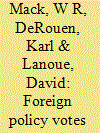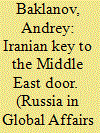|
|
|
Sort Order |
|
|
|
Items / Page
|
|
|
|
|
|
|
| Srl | Item |
| 1 |
ID:
119674


|
|
|
|
|
| Publication |
2013.
|
| Summary/Abstract |
This paper explores the role of foreign policy votes on presidential support in Congress. We postulate that a selection effect is inherent in this topic. Failing to consider that certain factors will influence whether a president takes a position on an issue in the first place can yield misleading results. For instance, presidents might not take positions during lame duck years or when their popularity is low. They might be more willing to take positions on international votes, votes requiring super majorities, or those that take place during a honeymoon period. In turn, this decision regarding position-taking can bias the outcome. We also capture the relationship between Congress and public opinion in our models as it is important to consider that the Congress is listening to its constituents as well. If the public identifies international problems as the most important to the nation, Congress might be more willing to vote in favor of the president on international votes. Testing key vote data from 1953 to 2003 for each chamber, we show that presidents are more likely to take positions if the vote is international, if the public identifies the "most important problems" as international ones, and if the vote requires a super majority for passage. They are less likely to take positions if they are up for reelection and are lame ducks. In turn, international votes, the percentage of the public identifying international problems as the most important, and the size of the president's majority have positive effects on presidential support. These findings are obscured if selection is not taken into account.
|
|
|
|
|
|
|
|
|
|
|
|
|
|
|
|
| 2 |
ID:
127051


|
|
|
|
|
| Publication |
2013.
|
| Summary/Abstract |
The election of Hassan Rouhani as Iran's president attracted everyone's attention with the inaugural ceremony attended by officials from more than 50 countries. The event gave rise to numerous propositions about a possible progress in the regime and in Tehran's future relations with the rest of the world. The prevailing perception is that the victory of a moderate and pragmatic candidate gives hope for a more fruitful dialogue which may facilitate the solution of numerous persisting problems. There is a good deal of reasoning in the propositions, yet deep-seated stereotype thinking still prevails. The assessments definitely need serious correction if we do not want to miss the opening opportunities - once again. In a situation of rigid Western economic sanctions and complicated relations with practically all of its neighbors, Iran nevertheless is turning into a most important state in a vast geopolitical area that embraces the Middle and Near East, Central and Western Asia. The Iranian aspect is present in practically all international problems that draw global attention, such as nuclear nonproliferation, the Middle East peace process, the legal status of the Caspian Sea, Central Asia, etc. Tehran is an active participant in the dialogue of civilizations and, naturally, remains one of the key players on the hydrocarbon market. To a large extent, Iran's role has been enhanced by the difficulties brought about by the Arab Spring in other major countries in the region, including Egypt - Iran's traditional competitor - which is sinking into the quagmire of internal political confrontation. Prior to the presidential election I happened to visit Iran and talk with some leading politicians and clerics about the situation in the country, their perception of the Iranian nuclear program and other issues that link Iran with other countries in the region and major world powers. Given the role played by the religious factor, it was particularly interesting to hear the opinions of religious leaders when visiting the holy Shi'ite city of Qom.
|
|
|
|
|
|
|
|
|
|
|
|
|
|
|
|
|
|
|
|
|